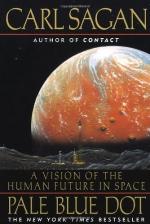
|
| Name: _________________________ | Period: ___________________ |
This test consists of 5 multiple choice questions, 5 short answer questions, and 10 short essay questions.
Multiple Choice Questions
1. What space probe was an important part of Sagan's career, and passed by a major planet in 1976?
(a) Newton.
(b) Tesla.
(c) Ion.
(d) Viking.
2. How likely does Sagan think it is that the records on Voyager will eventually be found?
(a) It is almost certain.
(b) It is reasonably likely.
(c) It is almost impossible.
(d) It is unlikely.
3. In what way is Titan's cold atmosphere an advantage for the formation of life?
(a) It protects its inner core from tidal forces.
(b) It helps certain compounds form quickly.
(c) It causes molecules to stay on its surface.
(d) It provides shields the moon from solar rays.
4. What is the major difference between space exploration and human exploration in the past?
(a) It takes months or years to get to the destination.
(b) Humans cannot travel to the places they explore.
(c) There is much more uncertainty in space.
(d) It is much less costly, in relative terms.
5. What scientist is credited with making the first discoveries that caused problems for the geocentric theory?
(a) Copernicus.
(b) Kelper.
(c) Ptolemy.
(d) Galileo.
Short Answer Questions
1. What fault does Sagan admit that science has?
2. What other medium was used to express the desire to wander, according to Sagan, as human civilization developed?
3. Which of the following is NOT one of the ways that Sagan says life seems to be?
4. What did ancient people notice about planets that set them apart from the stars?
5. Which planet was Voyager 2 intended to visit first?
Short Essay Questions
1. What would be the first things an alien visitor to Earth would notice about the planet?
2. What undesirable features of human activity might be easily noticed from space?
3. Briefly describe the progress made to undermine the geocentric theory.
4. Why does Saga say he is optimistic about the "human prospect"?
5. What was Sagan's involvement in the passage of Mars by the Viking probe?
6. What does the Strong Anthropomorphic principle suggest?
7. What planets had been explored by human beings, at the time of the writing of this book?
8. When this book was written, what was known about planets in other solar systems?
9. How has the attitude of the Catholic church towards Galileo changed over time?
10. How could Dermott's calculations about Titan be confirmed?
|
This section contains 718 words (approx. 3 pages at 300 words per page) |

|




